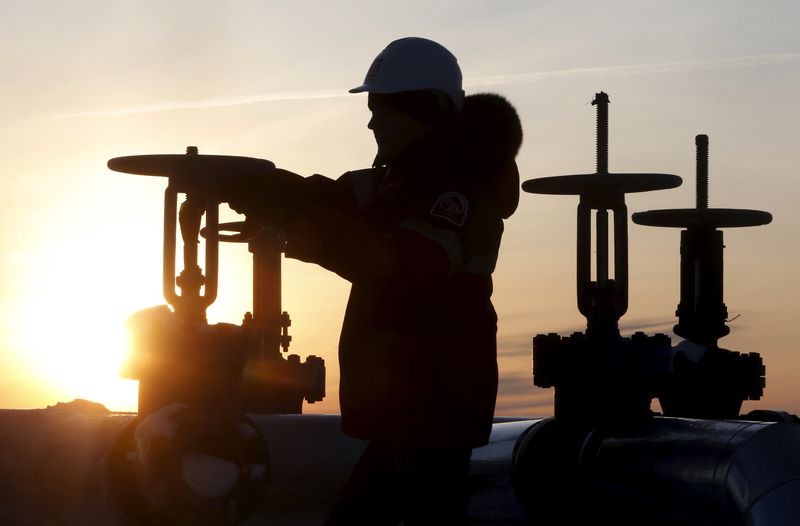TOKYO, July 22 (Reuters) - Oil prices rose on Monday amid
high tensions in the Middle East after a British tanker was
seized by the Iranian military at the end of last week.
Brent crude LCOc1 futures were up 51 cents, or 0.8%,
at$62.98 a barrel by 0042 GMT. The international benchmark rose
to as high as $63.47 earlier.
West Texas Intermediate (WTI) crude CLc1 futures were up
15 cents, or 0.3%, at $55.78.
WTI fell over 7% and Brent fell more than 6% last week.
"Falling global demand and rising U.S. stockpiles
have helped turn oil charts very bearish, but that may not last
as tensions remain high in the Persian Gulf," Edward Moya,
senior market analyst at OANDA in New York, said in a note.
Iran's Revolutionary Guards said they had captured a
British-flagged oil tanker in the Gulf after Britain seized an
Iranian vessel earlier this month, ratcheting up tensions along
a vital international oil shipping route.
Britain was weighing its next moves on Sunday, with few good
options apparent as a recording emerged showing that the Iranian
military defied a British warship when it boarded and seized the
ship three days ago. Prime Minister Theresa May's office said she would chair a
meeting of Britain's emergency response committee on Monday
morning to discuss the crisis.
A senior United States administration official said on
Friday the U.S. will destroy any Iranian drones that fly too
close to its ships.
A day earlier, the U.S. said one of its navy ships had
"destroyed" an Iranian drone in the Strait of Hormuz after the
aircraft threatened the vessel, but Iran said it had no
information about losing a drone.
The International Energy Agency (IEA) does not expect oil
prices to rise significantly because demand is slowing and there
is a glut in global crude markets, the Executive Director Fatih
Birol said on Friday in public comments.
The IEA is reducing its 2019 oil demand growth forecast to
1.1 million barrels per day from 1.2 million bpd due to a
slowing global economy, Birol told Reuters in an interview a day
earlier.
- English (USA)
- English (UK)
- English (India)
- English (Canada)
- English (Australia)
- English (South Africa)
- English (Philippines)
- Deutsch
- Español (España)
- Español (México)
- Français
- Italiano
- Nederlands
- Português (Portugal)
- Polski
- Português (Brasil)
- Русский
- Türkçe
- العربية
- Ελληνικά
- Svenska
- Suomi
- עברית
- 日本語
- 한국어
- 简体中文
- 繁體中文
- Bahasa Indonesia
- Bahasa Melayu
- ไทย
- Tiếng Việt
- हिंदी
Oil gains as Gulf tanker seizure raises tensions

Latest comments
Install Our App
Risk Disclosure: Trading in financial instruments and/or cryptocurrencies involves high risks including the risk of losing some, or all, of your investment amount, and may not be suitable for all investors. Prices of cryptocurrencies are extremely volatile and may be affected by external factors such as financial, regulatory or political events. Trading on margin increases the financial risks.
Before deciding to trade in financial instrument or cryptocurrencies you should be fully informed of the risks and costs associated with trading the financial markets, carefully consider your investment objectives, level of experience, and risk appetite, and seek professional advice where needed.
Fusion Media would like to remind you that the data contained in this website is not necessarily real-time nor accurate. The data and prices on the website are not necessarily provided by any market or exchange, but may be provided by market makers, and so prices may not be accurate and may differ from the actual price at any given market, meaning prices are indicative and not appropriate for trading purposes. Fusion Media and any provider of the data contained in this website will not accept liability for any loss or damage as a result of your trading, or your reliance on the information contained within this website.
It is prohibited to use, store, reproduce, display, modify, transmit or distribute the data contained in this website without the explicit prior written permission of Fusion Media and/or the data provider. All intellectual property rights are reserved by the providers and/or the exchange providing the data contained in this website.
Fusion Media may be compensated by the advertisers that appear on the website, based on your interaction with the advertisements or advertisers
Before deciding to trade in financial instrument or cryptocurrencies you should be fully informed of the risks and costs associated with trading the financial markets, carefully consider your investment objectives, level of experience, and risk appetite, and seek professional advice where needed.
Fusion Media would like to remind you that the data contained in this website is not necessarily real-time nor accurate. The data and prices on the website are not necessarily provided by any market or exchange, but may be provided by market makers, and so prices may not be accurate and may differ from the actual price at any given market, meaning prices are indicative and not appropriate for trading purposes. Fusion Media and any provider of the data contained in this website will not accept liability for any loss or damage as a result of your trading, or your reliance on the information contained within this website.
It is prohibited to use, store, reproduce, display, modify, transmit or distribute the data contained in this website without the explicit prior written permission of Fusion Media and/or the data provider. All intellectual property rights are reserved by the providers and/or the exchange providing the data contained in this website.
Fusion Media may be compensated by the advertisers that appear on the website, based on your interaction with the advertisements or advertisers
© 2007-2025 - Fusion Media Limited. All Rights Reserved.